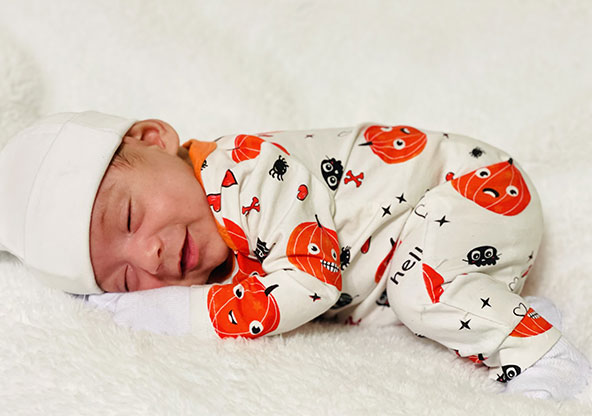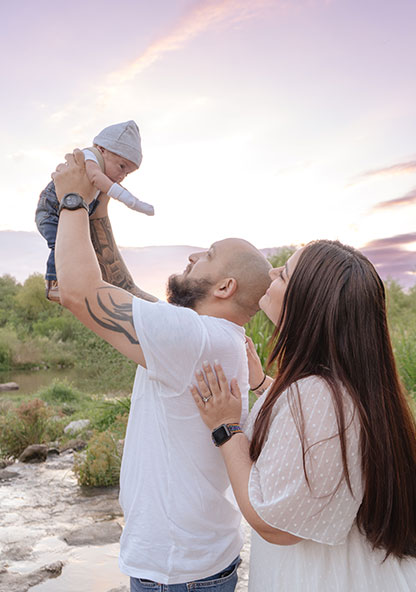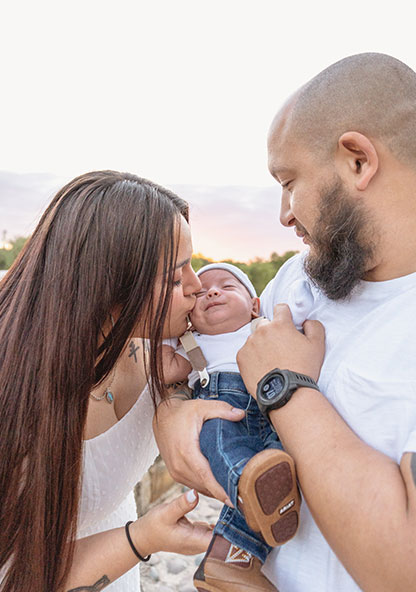Henry’s Story: Born at 25 Weeks, a Long-Awaited Son is Finally Home after More Than 100 Days in the NICU

Alexandra’s doctors determined that she had a condition known as incompetent cervix, which is characterized by weak cervical tissue in the lower part of the uterus and can lead to premature birth as well as the loss of pregnancies. After Alexandra learned she was pregnant again, her doctor put in a cerclage, which is a stitch in her cervix to help hold it closed and reduce the likelihood of a premature birth.
This fourth pregnancy was going well, but at 24 weeks, Alexandra noticed that her mucus plug had fallen out, which typically indicates that the cervix is beginning to dilate and that the body is preparing itself for labor. Alexandra went straight to the emergency room at CHRISTUS Santa Rosa Hospital – Westover Hills, where the on-call doctors there told her she was already 2 centimeters dilated, despite the fact that her cerclage was still firmly in place. Alexandra was immediately transferred to CHRISTUS Children’s in case she went into labor. CHRISTUS Children’s has a Level IV Neonatal Intensive Care Unit (NICU), meaning they offer the highest, most specialized level of care possible for premature and critically ill infants.
“It was such a scary time, but we felt reassured that we were in the right place if we needed to deliver,” Alexandra recalled. “I knew that if we did have our son early, at least he would have the best chance of survival there.”
Alexandra was admitted to the Labor and Delivery unit at CHRISTUS Children’s, where she stayed for a week under constant monitoring. She was nearing 25 weeks’ gestation, and her vitals looked good and there were no signs of labor or even further dilation. As a precaution, her doctors gave her supplements and steroids to help speed up her baby’s lung and brain development in case she did deliver early. Finally, after careful consideration, she was discharged home with strict orders to remain on bedrest.
Back at home, Alexandra was greeted by family members, all of whom were relieved that both she and her baby were OK. But later that night, Alexandra’s water broke. Henry drove her back to CHRISTUS Children’s, where they hooked her up to monitors and did everything they could to stop the labor. Twenty-four hours later, however, she began having contractions and it was determined that her baby was in distress.
And so, on June 1, 2023, at 25 weeks and 5 days gestation, Henry Arguello IV was born.
Henry’s delivery was attended by neonatologist Dr. Cody Henderson, and a large team of specialists, ready to perform any medical intervention Henry might need. Common among babies born this prematurely, Henry did not have a heartbeat upon delivery, but thanks to the swift and expert care from the team, he was quickly resuscitated and put on breathing support.
Henry spent the next 116 days in the NICU under the care of experts at CHRISTUS Children’s, including Dr. Maria Pierce, who specializes in neonatal-perinatal medicine and serves as System Director of Neonatology for CHRISTUS Health in San Antonio and New Braunfels; neonatologist Dr. Cheryl Motta, who is the medical director for the NICU at CHRISTUS Children's; Dr. Pratik Parikh, who is the assistant medical director of the NICU; and Dr. Sowmya Mohan, who also specializes in neonatal-perinatal medicine at CHIRISTUS Children’s.
Throughout his time in the NICU, Henry’s doctors, together with his nurses and the entire care team, monitored him closely as they helped him grow and develop.
“They ran every test possible to ensure they didn’t miss any of the typical complications many premature babies face,” Alexandra recalled. “His brain and his heart were both healthy. He did have high jaundice levels after his birth and needed to receive nutrition through an IV, and he was placed on seizure medication at one point as a precaution, but much of his treatment was just supporting his growth and development since he was so premature.”
At around 8 weeks old, however, Henry developed necrotizing enterocolitis, often referred to as NEC, which is a common but serious intestinal disease among premature babies.
“We got a call from Dr. Pierce in the middle of the night, and she calmly told us that she would like for us to come to the hospital—that it was best for us to be at his bedside,” Alexandra recalled. “He’d become lethargic, developed a fever, and his belly was distended. On a scale of 1 to 10, he was an 8, with 10 being the worst.”
Alexandra remembered being terrified that after everything they’d already been through, there was a chance they could lose Henry.
“We went to the hospital immediately and didn’t leave. I remember that Dr. Mohan found me a room to sleep in since Henry didn’t have his own room in the NICU yet. I stayed there for five days straight,” Alexandra said.
Thankfully, Henry’s doctors caught his condition early, and after quick and aggressive intervention, including intubation and IV antibiotics, he slowly began to recover.
“It’s crucial that we detect any symptom of NEC as early as possible, since timely intervention can be the difference between life and death with this condition,” said Dr. Mohan. “Early detection empowers us to implement effective treatments and minimize any long-term effects that could arise. In the realm of neonatal care, every moment counts, and our commitment to constant monitoring and early identification of any potential complications is a testament to our dedication to these tiny babies.”
Alexandra added that she would not have been able to get through that time without the guidance of Henry’s doctors and the entire team at CHRISTUS Children’s.
“The doctors were all so nice and wonderful and informative,” Alexandra said. “They always made sure I understood what was going on, and if I had any questions, I was always welcome to ask. They tried to make us feel as comfortable as possible and to understand our son’s condition and the details of his medical care.”
When Henry was finally better and able to get off the total parenteral nutrition (commonly known as TPN, meaning all of his nutrition was provided through an IV), he began to bottle feed, which presented another challenge.
“It was scary because he would choke on his bottles,” Alexandra recalled. “One night when I was feeding him, he started turning purple and I remember screaming for the nurses. It was such a learning curve for him to go from the IV to the bottle, but the nurses and doctors helped us get through all of it.”
Alexandra said she was especially thankful for Lisa, a lactation consultant at CHRISTUS Children’s, who helped her pump throughout Henry’s NICU stay so that he would have the crucial nutrients and antibodies inside her breastmilk.
“It is really hard to have your child in the NICU while you’re continuously pumping,” Alexandra said. “With everything you’re going through and the high stress levels, just continuing to pump so he could get that nutrition was truly one of the hardest things I’ve ever done.”
Alexandra’s perseverance paid off, however. On September 25, 2023, Henry was finally able to go home. Today, she is breastfeeding him and watching him grow and thrive.

To learn more about the Level IV NICU services available at CHRISTUS Children’s, visit CHRISTUS Children’s | NICU (christushealth.org).


